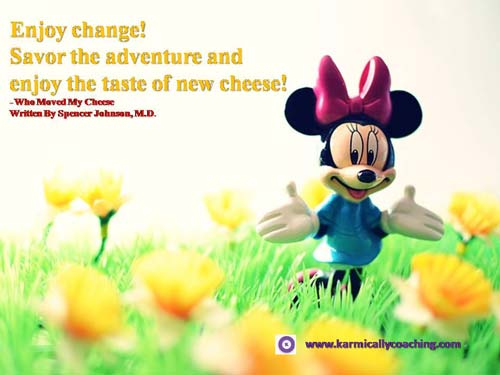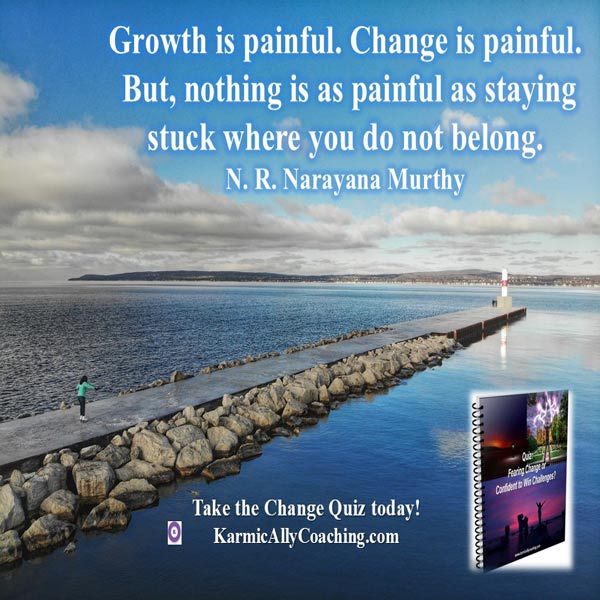This post has already been read 11710 times!

At some point in our life, we’ll face at least one situation that will create a change needing to be faced head on and conquered. It will be the only way that we can move on.
This change can happen in our workplace or at home. It can even compel us to bravely face the domino effect of a policy decision in our organization.
How we handle this change determines whether moving cheese has a positive or adverse effect on our careers and quest for life balance.
The Cheese in question is a metaphor for what you want in life – money, health, a great job, rising to the top of your profession, a loving relationship, a happy family life etc.
It was first mentioned in the book “Who Moved My Cheese” by Spencer Johnson, M.D, a fable on how we adapt to change.
I purchased this short book in 2001 at a bookshop at the Mumbai Departure Terminal while waiting to catch a flight back to New Delhi. I’d spent 2 days working on an important part of a project. My employer was buying out the share of our Joint Venture partner that would enable forward movement in the project.
The trip was even more significant because after a 2-year standoff, successful financial close. This meant our entire department would avoid being made redundant.
I wanted a short read for the two-and-a-half-hour flight and bought the book on the recommendation of the bookshop owner.
Little did I know this purchase would mark the beginning of a new journey.
Or how it would change my perspective on what cheese really meant to me.
For now, know that I loved the book. It became my favorite book to gift to my colleagues and quotes that I cherish as much those from Dr. Seuss.
Understanding Cheese and Change – the background
The book, Who Moved My Cheese, is a fable with 4 characters – 2 mice and 2 little people (Sniff, Scurry, Hem and Haw) who live in a “maze” in constant search for “cheese”. We learn how they react to and deal with unexpected change.
The maze is a metaphor for where we spend our time looking for what we want (within our workplace, outside it, in society, community at home etc).
The main characters react to change based on their personalities and attitude and learn valuable lessons along the way.
The Characters
The Mice
Sniff- sniffs out change early
Scurry- scurries into action
The Little People
HEM- Denies and resists change through fear
HAW- learns to adapt when he can see something better
Every day these characters run through a maze seeking special cheese based on their level of brain power and what they believe will make them happy finding their desired cheese based on their abilities.
The mice use trial and error to navigate the maze and often go off in the wrong direction or get lost. After a while they remember which corridors are empty and find their way back to cheese.
The Little People also learn from past experiences and do well but there are times when their beliefs and emotions get in the way which paralyses them from taking a simple action that can help get them out of their rut.
All is well until one fine day, the Cheese that they enjoy is depleted.
That is where the story of handling change begins.
The Mice had been keeping track of the Cheese levels and when it finally disappeared, they instinctively knew what they had to do and just got on with the search to find new cheese and ultimately succeeded. They adapted.
Hem and Haw were not prepared and went into complaining mode, procrastinating from taking action and reminisced about the good old days.
Many of us do this when we are attached to something. We cling to it blind to the reality that things are changing, and we need to adapt to change or move on.
Haw finally gets his act together and learns to adapt and enjoy change. Hem however has to learn the painful lesson of needing to change with changing time because the constants are in reality variable.
Moving Cheese Lessons from Real Life People
The beauty of the story lies in the fact that there is a bit of Sniff, Scurry, Hem and Haw in all of us.
Nobody likes change but that is something that happens all the time. The key differentiation is how alert we are to change and how we tackle it.
Coming back to my own story, the buyout was a success, and our jobs were safe. Everyone went about their work, putting in crazy hours.
We were motivated thinking that there was an abundance of cheese that was worth compromising other areas of our life. We were complacent.
The cheese platter fell with a resounding sound a year later. Top management had decided the project wasn’t viable and no longer a part of their core vision.
The fate of a close-knit team of more than a dozen professionals including 4 in top management became uncertain. What made it worse was that the economy was heading into recession. No one would have blamed us for any hemming and hawing.
Even those who were privy to confidential information were caught unaware in a matter of 24 hours.
They say hindsight is 20:20 vision. Suddenly the resignation of a few of the junior staff in the team who were considered no more than flies on the wall a few months before we were hit with the bad news started to sound like Sniff and Scurry.
They had run off looking for new cheese before the old cheese got stale. Perhaps their survival skills were strong enough to have sensed that the buyout may not lead to project completion. They decided to cut their losses in advance.
Those of us who could be absorbed into other departments jumped at the opportunity because cheese meant job security.
Unfortunately, some of us were made redundant and that is where the Hem and Haw survival skills came in.
Some middle management members made a graceful exit that included a farewell party after negotiating generous redundancy settlements. Others clung on in the hope that a miracle would take place in the form of new cheese.
It took time to wind down the department. While half the department moved on in search of new cheese, some of the senior most management had a tough time letting go of the cheese which had prestige and an enviable paycheck that was no longer there.
Key Takeaways from the Cheese being gone
There are many lessons that the book taught me, but key takeaways became apparent during the pink slip situation. They hold for any kind of change.
- Change is scary.
- You need to be alert to signs of change but not get sucked into the rumor mill.
- The only thing in life you can be sure of is change- and sometimes it will be radical
- You should not take success for granted or become complacent but be willing to take calculated risks/move with the times loose the cheese.
- The key to survival is to be flexible, agile and responsive.
- Our view of life and future possibilities can be affected by our past experience. If you sense that you have a limiting belief, do something about it to make your actions. productive and constructive, not run around doing the same ineffective chasing of your tail.
- Each person has different motivations/reasons for resisting and will need to be treated differently.
- Recognize what stage people are at (shock acceptance denial etc) and help people move through it.
- Train develop support and encourage, involve people in change
- People need to be encouraged to explore their own attitudes and develop coping strategies.
Can your Cheese include Work Life Balance?
The answer is a resounding yes. The event I write about took place more than 2 decades ago. Change was cathartic for many of my colleagues because redundancy in white collar professional jobs was unheard of in India at the time.
It’s another thing that the global recession of 2008 and the pandemic of 2022 have now completely shaken our preconceived notions about eternal cheese.
The concept of redundancy counseling did not exist nor was there a scheme to help middle to senior career professionals find new jobs. We did not know how to find new cheese or even dream of new cheese.
Things were a little better for me having worked abroad and having previously experienced redundancy in the post-Gulf War period.
I knew that even though I was caught unawares, there were ways to deal with the situation.
The first step was to negotiate a good settlement package while my boss still had the power to help me. I had to get out of an environment which was going to get toxic as the deadline to close the department approached. I moved on.
Those were difficult times because of the recession. While it was challenging to get a new job immediately, I chose to put some other matters in place which had been neglected due to my long working hours.
I learned candle-making and ventured into writing stories for children which were published in 2 leading Indian children’s’ magazines.
Finding new and improved Cheese!
I eventually did land a wonderful job that gave me a career and work life balance but I had learned the lesson that I could create my own cheese.
The foundations for becoming the Karmic Ally Coach were being laid even though it would be a few good years before the final transformation of my cheese.
Others adopted a different approach which included keeping their heads down and finding new cheese, even if it meant accepting inferior cheese.
The colleagues who could not see beyond the vanished cheese had it bad and challenged the organization. They were literally thrown out of the maze with no cheese as a parting gift.
2 decades later, I am still in touch with quite a few of my colleagues and their cheese story which was driven by uncertainty and fear has changed.
Many moved onto new mazes or created their own maze which has elements of a life outside of the organization with more balance and perspective.
What we have learned about cheese
There is more to simply towing the party line at work and chasing cheese that the organization keeps moving and putting in endless hours because the cheese bait demands it of us putting our health and work life balance in jeopardy.
We no longer accept our fate. Instead in the years that have followed, we have broken the rules. We’ve challenged the limitations and constraints that once bound us to blind alley cheese chases and created our own reality.
An important point that Professor Deepak Malhotra, a professor at the Harvard Business School and author raises in his book I Moved Your Cheese.
We have discovered that what drives us is not necessarily having cheese but a plate of cheese that inspires us to be creative and be different.
The quest for self-made cheese has found expression in various forms in new organizations whereas leaders we are respected for guiding others to self-actualizing cheese while helping the organization to grow. We are thriving.
Final Thoughts
While I still believe that my former employer could have handled the situation better and not expected its employees to blindly accept a life and career affecting change without challenging it, I also believe that the onus to create cheese that offers us the best of both worlds depends upon us.
To create the cheese of your choice, there are certain questions that you need to ask yourself which I detail in my self-study course Life Focus in 7 Days and the actions that you need to take to create that life and a cheese that will stand the test of time.
It requires looking at each aspect of your life and considering whether you are happy with it and what needs to change. Once you know the core ingredients of your cheese, the next step is to create it. That is one thing that only you can do whether supported by a coach, mentor or on your own.
Which cheese are you running after? Does it satisfy you or do you know deep in your heart that there is a better cheese out there? Do you dare to create your own cheese?
Are you ready to move your career cheese?
Update 15 July 2021
2020 was a difficult year and as I write, India’s horrific second wave is still ebbing and we are preparing for the third wave of the pandemic.
I thought the worst was over in January this year especially since we had the vaccine but obviously this was the calm before the storm.
I’m not going to crib about how the preparation for the second wave was mis-managed. I’ll leave that for the politicians and news channels to sort out.
What I am going to do instead is to share a new course which is relevant to many professionals in recent times.
If 2020 made us wake up to smell the coffee, then it also made us realize what was really important in our lives.
It’s our family, friends, health and our chosen career.
Even though I specialize in Executive Coaching, more and more professionals are reaching out for help with their careers and support in finding clarity on what they really want but more importantly what they need.
Does that sound like you?
With that in mind, I invite you to visit Karmic Ally Coaching’s Success Solutions and check out 5 Days to Zero in on your important Career Need course.
It’s short, doable and will help you plan your next step. Click here or on the below image to enroll.






 I adhere to the Certified Coaches Alliance Code of Ethics and Standards. A copy is available on request.
I adhere to the Certified Coaches Alliance Code of Ethics and Standards. A copy is available on request.
 Let's Talk through the Connect Form:
Let's Talk through the Connect Form:
Some very good thoughts that bring us around to pushing ourselves further. Only by pushing ourselves do we grow. Thank you, KA!
Thank You Henri. You are absolutely right. When we are willing to step out of our comfort zone and challenge our status quo we create opportunities for development and growth. Thanks for dropping by at The Karmic Ally Coaching Experience Blog.
I have never read this book personally, though I have read many snippets and interpretations of it. It reminds me of the quote “I like progress, I just don’t like change.” Oftentimes you can’t have one without the other. Change is the only constant we face, really. It happens in big ways and small ways and it’s all how we deal and respond to it that makes us successful or unsuccessful. If we learned a lesson, we did not fail, we just did not succeed in that attempt. Thank you for the reminder and the recommendation – I will have to actually read this book now!
You are so ‘on the money’ about liking progress but not liking change, Tamara. I guess it is human nature that we like to stay within our comfort zone. I’m delighted that you intend to read the book. Every time I read it, I learn something new about situations and managing them.
I read this book some years ago. I had forgotten how pertinent it is to life. I am currently on the hunt for new cheese, but my existing cheese is still fresh and tasty. Maybe it’s that I’m looking for additional cheese?
Quite possibly Lori Ann you want a platter of cheese that complements the cheese that you already have. Why not? Go for it! Cheese is good. 🙂
As many people said here, this is a great post! Thank you Vatsala for sharing. You introduced me a very interesting book and I would like to read it sometime soon. I can easily imagine life as a maze. We don’t know where and how to get a cheese, so we just need to keep trying and learning from mistakes and changes that we go through. Thanks!
Learning from mistakes and not giving up on our cheese are core to getting what we want in life, Kaz. Each time I read the book Who Moved My Cheese, I discover something new about myself. Enjoy the book!
Really enjoyed your post Vatsala!! Change can be so difficult, but so worth it 🙂 I have never read this book but I think I will now 🙂 Thank you!!
Welcome to The Karmic Ally Coaching Blog, Joan. I’m delighted that you enjoyed the post and are planning to read the book. You are absolutely right about change being difficult but in the long run, when we adapt or challenge the change and find something that is more aligned with our core values and goals, the challenge is well worth it.
Great post Vatsala! I also have not read the book but have seen references to the concepts within it throughout my life. Your “cheese” should be assessed often and if necessary you should adapt it to suit where you want to be. Cheers, ian
Thank you Ian. I’ve noticed that there are a number of people who have not read the book but are aware of the concepts from citations in articles and other media. It is definitely worth reading and is available on Kindle too. You are absolutely right about the need to assessing one’s cheese or goals and adapting if and when required or even moving onto a more meaningful goal depending upon the stage of one’s life. Thanks for dropping by at the Karmic Ally Coaching Blog.
Hi Vatsala,Very important life lessons and wisdom in this piece. The situtation you've described so simply and beautifully in your post resonates with most of us having been at crossroads at some point in time in our careers/life. I must admit I'm at a similar juncture where i need to find my 'new cheese'. I'm optimistic though that the new upcoming phase will catapult me to operating at a much higher platform with happiness and peace as its key pillars. Regards
Hi Pallavi. I’m glad you liked the post. We all have to face change and challenges at some point or the other and knowing what we want helps us to create that cheese platter which is delicious. Looks like you are already creating the ingredients for your cheese and that is awesome!
Great post Vatsala – so many elements of it struck me: of course, having someone direct you to read Who Moved My Cheese? at a point when your cheese was on the move. I also really liked reading about how differently the people working on your project responded to its cancellation. So many lessons learned here – and a reminder for me to re-read this book.
I do believe in Divine Intervention and sometimes, there is a synchronicity of events to prepare us for a bigger event ahead of us which will need to be faced with Grace, Deb. The fact that redundancy was an unheard of concept for professionals in India at the time and we don’t have a union forced all of us in the Group to learn how to face corporate decisions that risk our careers and to finally understand that business is business and we need to look out for ourselves. I keep reading the book often for inspiration and never tire of it. Enjoy returning to the book for new perspectives!
Wonderful post! Taking responsibility for how we handle change is key. We can choose the outcome. I love how you related the book to your experience. I have a renewed sense of purpose and power after reading your post.
Thank you Cierra for the compliment and a bigger thank you for helping me to achieve the purpose of the post – motivate the reader to take inspired action.
Love this post, Vatsala and have top admit that I haven’t read Who Moved My Cheese?, although I know I would enjoy it immensely and will definitely read it in the near future. My favourite line in the post is “We discovered that what drives us is not necessarily having cheese, but a plate of cheese that inspires us to be creative and different.” This really resonates with me as the way I have lived my life and how many people have suggested I would be best to only have one piece of cheese on my plate at a time. The type of person I am, I am stimulated by a variety of projects and still see an overarching theme in them all. To bring people together in community and to be a messenger of possibility, sharing ideas and creating conversations. Thanks for such an inspiring post! Very happy I had the opportunity to read it.
I’m delighted that you enjoyed the post, Beverley. It is post that has been waiting to see the light of day for a long time and then I decided it is time to share the story. Redundancy and fear of redundancy eats into a person’s self-confidence and many go through the Grief process too until they realize that better opportunities await them, especially if they want to recreate their perception of Ideal Cheese. We can have it all!
You will love the book which is actually a quick read but with depth.
As a former career counselor I wish I knew about this book to give to my clients. I know from first-hand experience how unprepared many people are with employment change and the skill level to adapt & search for new change varies greatly. Loved reading this for your wisdom in applying the fable to real life, well written and meaningful.
I am grateful for the ultimate compliment that I could have received, Roslyn. Thank you!
The book Who Moved My Cheese had been around for a while when I chanced upon it at the Mumbai airport. Perhaps a message from the Divine that changes were afoot and that my colleagues and I should not have gotten complacent after the successful financial close to the Buy Out. The book has since been repurposed as short day courses and I’ve even seen a video or two on YouTube. Some books are classics even if we don’t realize it till much later.